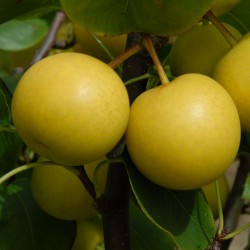Special Offers
Redeem Offer Code
Redeem Gift Voucher
Scarecrow Members
Our Feedback
Arrived in great condition
Potted up for couple of weeks before planting out
Looking good
C W, Sheffield
Asian Pear Tree Nijisseiki




Pyrus pyrifolia 'Nijisseiki'
- Medium sized, round, yellow fruit with a pear like taste.
- Fresh, juicy and pleasantly sharp.
- Said to be the most flavoursome of all Asian Pears.
- Sometimes known as '20th Century'.
- Despite being recognised as Self Sterile these actually prove to be partially self fertile and can produce small crops without a pollinator.
- Pyrus betulifolia rootstock.
Supplied as a bare root tree pruned to approximately 3-4 ft (90-120cm) tall including roots.
Available from APPROXIMATELY late November / early December1 or more £24.95GBP each. Group & quantity discounts
Currently Not Available to Buy
Description
Originating from Japan in about 1900 (hence its other name of '20th Century), this is often recognised as the most flavoursome of all Asian Pears. The rounded yellow fruit have thin skins and a fresh and juicy pear flavour with a pleasantly sharp finish.
Asian (sometimes known as Nashi, Sand, Oriental, Chinese or Sahli Pears) have been popular on the Continent for many years but are virtually unknown in the UK. From our own experiences we would say they are just as reliable as conventional pears - if not more so. A very worthwhile subject for the garden indeed and one we highly recommend.
Disease resistant.
- Despite being recognised as Self Sterile these actually prove to be partially self fertile and can produce small crops without a pollinator - though pollination by another Pear (Asian or a conventional European variety) will maximise yield.
- Grown on Pyrus betulifolia rootstock for an ultimate (un-pruned) height of 8 - 12 feet (2.4 - 3.65 metres) but can easily be kept at a height of 6 - 8 feet (1.8 - 2.4 metres).
- Harvest mid August - the fruit is ripe when it pulls easily from the tree.
Recommended by the RHS to be an excellent attractant and nectar source for bees and other beneficial insects.
Recommended by the RHS to assist in encouraging bats into the garden as the flowers are likely to attract moths and other night-flying insects which bats love to eat!
How To...
How To Plant Fruit Trees & Nut Trees
Detailed advice on planting fruit and nut trees - including advice on container growing, pruning and training, and advice on specific varieties.
How To Videos
How To Plant Bare Root & Potted Fruit Trees (Video)
An instructional video by Stephen explaining the differences between a bare root and potted fruit tree, and how to plant them.
General Information
Fruit Tree Pollination Simplified (hopefully)
Information on fruit tree fertility, pollination and compatibility, with simple explanations of regularly used terms.
Pollinator Friendly Plants
A detailed guide to the seeds and plants sold by Victoriana Nursery Gardens that will attract and provide a food source to bees and other beneficial pollinating insects.
Magazine Articles
Tree Wishes
Tree Wishes - magazine article giving inspiration to those thinking about growing fruit written by Stephen Shirley for Grow Your Own magazine.

 01233 740529
01233 740529





